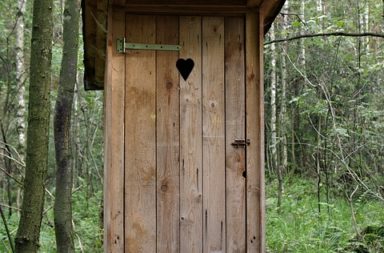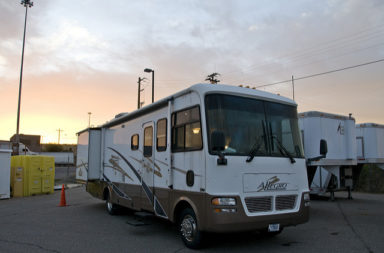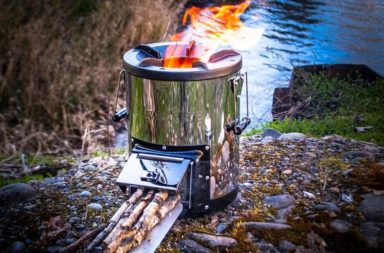Living off the grid is something a great many of us strive for. It is perhaps the ultimate expression of prepper self reliance, and something wrapped in appealing romantic ideas. After all, isn’t the off the gridder prepared for anything, not reliant on anyone else, and able to brave through situations that leave others miserable? Well… yes and no.
For several years I lived off the grid on a sailboat anchored out in San Diego harbor. You’d think this would be living the dream (other than being in California.) Well, I thought so too, but it turned out to be a nightmare, because living off the grid can really suck sometimes. For instance…
You Need Money
This simple concept gets lost in translation sometimes. I was poor, working a mediocre sales job, and having a inexpensive boat looked like cheap rent. So I bought a small trimaran sailboat that offered all the discomforts of home and never looked back. Now don’t get me wrong, part of my problem was that I had a 30-foot long boat. Living on that basically amounts to roughing it with an ocean view.
But it was all I could afford at the time. In comparison, a guy at the other end of the bay with an enormous 50+ foot long trimaran was living large.
But back to money. Right off the bat I was setting myself up for off the grid misery by buying just the barely acceptable. There was no waste tank on my boat, and I had to empty the small tank on my portable toilet on a near daily basis. Not fun. Running water came from a manual pump, and electricity from a couple of solar panels and a sketchy battery bank. I was too poor for a generator, and the solar setup came with the boat. No TV or computer for me.
Refrigeration was also a chore. Fridges are power hungry creatures. I couldn’t afford a good fridge or the means to power a mediocre one. That meant using an icebox, or taking home fresh food on a daily basis if I wanted something that didn’t come from a can. Whee.
Seriously, You Need Money
Are you seeing a theme here? I was basically camping out at anchor, and rowing a dinghy in to shore every day to go to work. I read by the light of the sun, or my regular lights while the battery lasted. It got to the point where I was using a Coleman lantern and a couple solar charged lamps for lighting because my battery bank was so bad, and I couldn’t invest in new ones.
That’s the dirty secret when you are poor or broke. You can’t readily invest in the high quality goods that make your life easier, and you can’t always afford to sit and wait to save the money to get them. You need a solution now, and that means spending your limited funds on something less efficient. The cycle is vicious and hard to get out of.
The savvy prepper will see the problem here. The less money you have, the harder it is to live a modern lifestyle. The question is how far back in time do you want to go?
In my case, I was living this perverse combination of a modern life just half a mile from shore. In many ways it was a direct throwback to the 1930’s in many rural parts of America.
Prior to extensive rural electrification, a household might have a few battery operated appliances like a radio. If they were lucky, they had some sort of generator they could fire up to run a washing machine and recharge batteries and such. They used oil lamps, or just went to bed when the sun went down. They might have had a telephone, but their rural farmer co-op line probably wasn’t the best quality, although it was better than nothing.
That was my circumstance. I was surrounded by one of the most modern cities in the world. The 21st century was within easy reach of me, but as soon as I got home, I lost most of the material benefits of that technology. Unable to afford reliable power generation to meet my needs, I lost 70-80 years of human progress in an instant.
But The Simple Life Isn’t Bad Is It?
If by simple life, you mean free of excess distractions and responsibilities, then no, it isn’t. But one free of the many labor and food saving devices we’ve come to depend on is. Electric lights are cheaper and safer than gas or oil lamps. Refrigerators beat ice boxes. Having your own washing machine on hand saves time. Being able to use a computer makes it easier to interact with the rest of the world, or even make more money.
Let me make it clear – I’m not advocating against the off grid lifestyle. Or even the poor off grid lifestyle. I am saying you have to go into it eyes wide open. Because the less technology you take with you, the harder your life gets with each missing piece. The curse (or blessing) of being a historian is at times you can almost point to the year you’ve regressed to when you start dropping tech.
Now there were a lot of pleasant things about this lifestyle. There was a lot less hubris – after I finished my pre-industrial chores for the day. Sitting back and reading a book or listening to the radio was pleasant and relaxing. But being dependent on batteries and gas drove home the limits of my situation.
Adapting To The Poor Off Grid Life
The secret of modern civilization lies in cheap, affordable power. Electric motors took over from steam engines, animal power, and manual power. Steam engines overtook water power, the list backwards goes on and on. But it has only been in the last several hundred years that humans could really start the long process of moving away from raw muscle power (human or animal) for many important tasks.
Tracking that history is fascinating, and tells the smart prepper how to adopt off grid. They can look at their skills, their abilities, their situation, and their income and point to almost any place in time and go “Here is where I draw the line.”
Now off gridding on the land is going to be easier than on a boat. You have more room for stuff, and it is easier to get supplies. But the budget beast will always haunt you. Your diet will change. You’ll be eating more preserved or seasonal foods, and less refrigerated goods. If you have a small farm and garden plot, your life will be a lot easier.
In fact, the rule of the day might be “conserve.” Everything you do will be an act of conservation. Conserving your food. Conserving your physical energy. Conserving whatever electricity you have. Conserving fuel. Conserving heat. Conserving water. You become critically aware of the energy cost of everything from making breakfast to taking a shower, and the less you have invested in your power systems, the harder everything is.
And by power systems, I mean everything that creates energy. Maybe you’ve got a wind and solar battery bank that keeps the lights and a small computer on. Maybe you don’t. You’ve probably learned to light spaces you are using, instead of entire rooms and to make optimal use of natural light. Maybe you’ve got a generator on your well, maybe you hand pump into a cistern. It all now comes at a greater cost than you’ve ever experienced before.
Preparing Yourself
You might find a better quality of life as a poor off the gridder than as a poor on the gridder- if you accept the reduction in modern conveniences. A comfortable working class lifestyle of a century ago is far easier to maintain than one of today. A warm bed, a roof over your head, a full belly, wood in the woodpile, and food in the pantry go an awful long way to living a darn comfortable life.
Make a list of what modern (and that really means devices that go all the way back to the late 19th century) devices you can and can’t live without. Determine how much reduction in their use you’ll accept. Then you can start developing your low income off grid experience. Each person and family will have different circumstances. Off grid in an RV on 20 acres is different than off grid in a tent, or in a cabin or house. You will have to make difficult choices about sanitation, water and communications.
Cell phones make life easy, but nothing beats the sheer convenience of a flush toilet – if your off the grid haven is setup or that luxury. Heating water will also become a chore. How are you going to do it? This and many more questions around the use of energy must be answered before going off grid on a budget.
Conclusion
I’ve been there, done that, and got the somewhat stale and smelly t-shirt for it. Living off grid when you are poor is tough. No matter where you do it, you are working harder than you would on the grid, or with a better setup.
The more you minimize your setup, the more you have to work at even basic chores. By carefully planning your shoestring budget preps, you can live a comfortable and secure life. It might not be a modern life, but it will be a good life. Or it will be a disaster. That is entirely up to you. I wouldn’t do it again, but you might want to.


